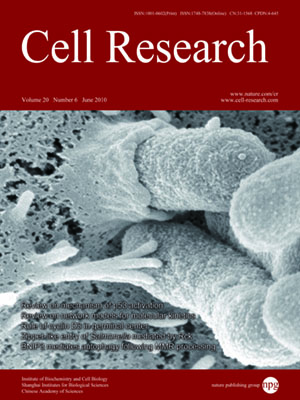
Volume 20, No 6, Jun 2010
ISSN: 1001-0602
EISSN: 1748-7838 2018
impact factor 17.848*
(Clarivate Analytics, 2019)
Volume 20 Issue 6, June 2010: 665-675
ORIGINAL ARTICLES
BNIP3 is essential for mediating 6-thioguanine- and 5-fluorouracil-induced autophagy following DNA mismatch repair processing
Xuehuo Zeng1,2 and Timothy J Kinsella1,2
1Department of Radiation Oncology, Cleveland, OH44106, USA
2The Case Integrative Cancer Biology Program, Case Western Reserve University, Cleveland, OH44106, USA
Correspondence: Timothy J Kinsella,(timothy.kinsella@case.edu)
DNA mismatch repair (MMR) processes the chemically induced mispairs following treatment with clinically important nucleoside analogs such as 6-thioguanine (6-TG) and 5-fluorouracil (5-FU). MMR processing of these drugs has been implicated in activation of a prolonged G2/M cell cycle arrest for repair and later induction of apoptosis and/or autophagy for irreparable DNA damage. In this study, we investigated the role of
Bcl2 and adenovirus E1B
Nineteen-kilodalton
Interacting
Protein (BNIP3) in the activation of autophagy, and the temporal relationship between a G2/M cell cycle arrest and the activation of BNIP3-mediated autophagy following MMR processing of 6-TG and 5-FU. We found that BNIP3 protein levels are upregulated in a MLH1 (MMR
+)-dependent manner following 6-TG and 5-FU treatment. Subsequent small-interfering RNA (siRNA)-mediated BNIP3 knockdown abrogates 6-TG-induced autophagy. We also found that p53 knockdown or inhibition of mTOR activity by rapamycin cotreatment impairs 6-TG- and 5-FU-induced upregulation of BNIP3 protein levels and autophagy. Furthermore, suppression of Checkpoint kinase 1 (Chk1) expression with a subsequent reduction in 6-TG-induced G2/M cell cycle arrest by Chk1 siRNA promotes the extent of 6-TG-induced autophagy. These findings suggest that BNIP3 mediates 6-TG- and 5-FU-induced autophagy in a p53- and mTOR-dependent manner. Additionally, the duration of Chk1-activated G2/M cell cycle arrest determines the level of autophagy following MMR processing of these nucleoside analogs.
Cell Research (2010) 20:665-675. doi:10.1038/cr.2010.40; published online 6 April 2010
FULL TEXT | PDF
Browse 2462


